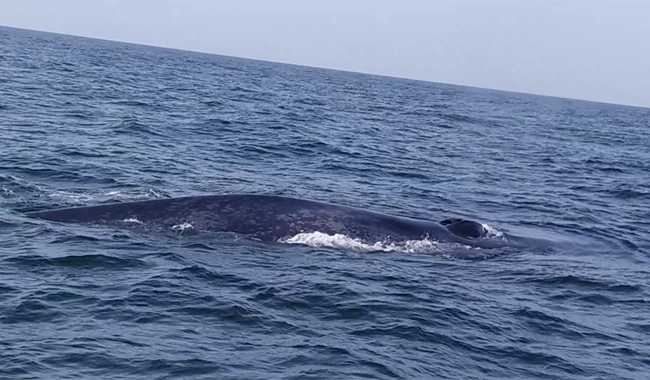News Desk |
WWF-trained skipper, Saeed Zaman, was overwhelmingly surprised when he first spotted a 17-meter long, gigantic mother blue whale in pair with her calf in the waters of Churna Island, Balochistan, while he was fishing for Tuna fish in the sea.
According to the account of the skipper, the blue whale fish was equal to the length of his boat. However, nothing can be discerned about the size of the calf since the baby blue whale did not surface much.
Read more: Proud Moment for Pakistan: Gilgit-Baltistan praised internationally…
Statistics of Sightings
Known is the fact that Pakistan’s exotic coastal region has tremendously been recording the presence of a variety of marine animal breeds.
In one year alone in 2016, total 47 sighting of baleen whales were reported along the coastline of Pakistan. This fresh sighting is, however, a firsthand account of the presence of a live specimen.
Several times earlier, there have been reported cases of sightings of skeletal remains of the beached whales on the various spots along the coastline of Sindh and Balochistan. The last such case of a dead specimen was reported along the coast of Sindh, at Khuddi Creek in August 2014.
In one year alone in 2016, total 47 sighting of baleen whales were reported along the coastline of Pakistan. This fresh sighting is, however, a firsthand account of the presence of a live specimen.
WWF-Pakistan Observation Program
WWF-Pakistan Technical Advisor Moazzam Khan has described the presence of the blue whales in the waters of Balochistan not only as a signifying omen for the existence of the diverse marine life but also an indication of the conducive marine environment the national coast offer for the nurturing of such species.
“Through this program, trained fishermen have so far released 60 whale sharks, 45 Mobulas, 25 sunfish, 6 dolphins, one finless porpoise, 5 whales, 25 sea snakes, 5 masked boobies (seabirds) and thousands of marine turtles.”
He further attributed the increased sighting of internationally declared endangered marine species as the result of the relentless and effective monitoring activities practiced by the WWF-Pakistan.
Read more: KPK shines and so does Pakistan: Billion Tree Tsunami Project
Under their crew based observer program, they have trained more than 100 fishermen and skippers about how to record the sightings of megafauna – whales, dolphins, whale sharks, Mobula rays, turtles and sunfish and also ensure the safe release of such animals in case of entanglement.
“Through this program, trained fishermen have so far released 60 whale sharks, 45 Mobulas, 25 sunfish, 6 dolphins, one finless porpoise, 5 whales, 25 sea snakes, 5 masked boobies (seabirds) and thousands of marine turtles.”
Conservation of Biodiversity
Churna Island, which serves as a major recreational spot for the inhabitants of Karachi, is also the abode to the endangered marine animals such as whales, whale shark, and sun fish.
Blue whales reproduce once in every two to three years since the gestation period takes from 9 to 12 month.
After declaring Astola Island on the same coastline near Pasni as the first marine protected area this year, NGOs and related agencies working in the close aide with the Government of Balochistan, Wildlife Department, are now making the legitimate demands to include Churna Island too, in the list of the Marine Protected Areas.
Blue Whales who are considered as the largest mammals living on the Earth has an estimated length of 30-metres.
Despite being heavy weight sea creature, they are extremely reliant upon tiny shrimps like animals called Krill or Pelagic shrimps which are fortunately found in abundance in the Arabian Sea, which constitutes major coastline stretching from Sindh to Balochistan.
With the global population of around 10,000 to 25,000, the species is internationally declared as an endangered animal which is, unfortunately, juggling with the extinction.
Blue whales reproduce once in every two to three years since the gestation period takes from 9 to 12 month.
Read more: Chabahar: A new transit route
Despite being heavy weight sea creature, they are extremely reliant upon tiny shrimps like animals called Krill or Pelagic shrimps which are fortunately found in abundance in the Arabian Sea, which constitutes major coastline stretching from Sindh to Balochistan.
Rab Nawaz, Senior Director of WWF-Pakistan, has not only lauded the efforts and cooperation of fishermen but also insisted on the protection of the biodiversity of the coastline so that the marine animals who are on decline may continue to feed, and reproduced in the region.














